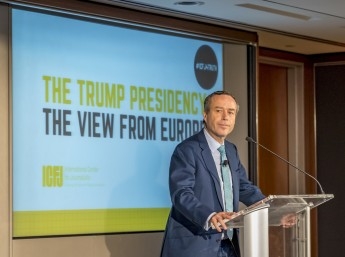
Financial Times editor Lionel Barber shares his view of the Trump presidency. Photo Credit: Steve Strasser
Financial Times Editor Lionel Barber says journalists must place a greater emphasis on the verification of information at a time when “there are no accepted facts.”
“Journalism must fulfill with renewed vigor an old task: that of aggregating and verifying sources,” he said. “It must endeavor to put the imprimatur on those sources, assessing them for reliability, quality and context before passing them onto readers,” he said as the keynote speaker at a special event held by the International Center for Journalists (ICFJ), attended by 100 media leaders and ICFJ supporters.
He said this new era challenges the news media to be more diligent than ever. He added, “At the FT, we have a cast-iron rule: better to be right than first with the news. This is even more important now that opinion too often trumps facts. We need to separate the two.”
Barber provided a view from Europe following President Trump’s recent international trip. He noted three trends that he said are profoundly changing the political culture in America: the advancement of a parallel universe of alternative facts; the rise of personality-driven politics at the expense of informed debate; and an increase in real-time communication “where politics, journalists and the public ... have become prisoners of the present.”
Citing Franklin Roosevelt, John F. Kennedy and Ronald Reagan, he said there is nothing new about personality-driven politics in the United States. “But Donald Trump, who spent more than a decade in the people’s living rooms as host of ‘The Apprentice,’ has taken the art to a new level.”
Barber also said healthy democracies depend on institutions, not just a free press. “Journalists have a duty to hold those institutions to account, just as they do elected politicians. But in times of trouble – and these are troubling times – they should take care to defend and respect those institutions... The alternative facts are too awful to contemplate.”